Do vegans kill bugs? Yes, some vegans intentionally kill insects in response to infestations, fear or self-defence. And mere human existence causes unintentional deaths to bugs every second.
Since going vegan in 2014, I’ve murdered flies, mosquitoes, ticks and vacuumed up the odd spider. Not to mention the slugs I’ve washed down the drain, found in my organic broccoli because I couldn’t see them. Yet, I don’t consume honey or silk because of bee and silkworm exploitation. Am I a hypocrite?
I’m not alone in this. Ethical vegans and animal lovers trying to grow veggies at home are confronted with the dilemma of dealing with birds, possums, rats and bugs taking their food.
Then you have the poor folks in warmer climates managing mass ant invasions.
Maybe you’re resentful towards moths for ruining your clothes. Or you’re genuinely freaked out by cockroaches—so you kill them on sight.
If that’s not enough, a day spent with a crop farmer will make any vegan uncomfortable. Harmful chemicals and industrial machinery wipe out bugs at scale. And farmers don’t hesitate to trap or shoot any “pest” that comes within range of their food.
The demand for these crops undoubtedly increases the number of crop-related insect deaths.
So where does that leave vegans with a bug issue? Let’s start with insect sentience.
Do insects feel pain?
To answer this question, we need to understand the difference between nociception and pain.
Nociception is the process by which the body detects potentially harmful stimuli and produces a reflexive response to protect itself.
Pain, on the other hand, is a subjective experience that results from nociception. In other words, pain is the mind’s interpretation of non-nociceptive signals.
Insects don’t have the same sophisticated nervous system as humans, so they’re not capable of experiencing pain in the same way we do. For instance, bugs will continue their regular activity even after sustaining an injury.
According to a 1984 paper, Do insects feel pain? – A biological view, researchers couldn’t find an example of insects showing protective behaviour towards injured body parts, such as limping after a leg injury or avoiding eating or mating due to abdominal pain.
This is a very different experience to invertebrate like a dog, who typically yelp when in pain and then try to avoid anything that may aggravate the injury.
In saying that, insects do have nociceptors that allow them to detect potentially harmful stimuli. Bugs often display a reflexive response when these receptors are stimulated, such as moving away from the stimulus or trying to escape.
Some research shows that insects can display emotional responses like pessimism. In this study, researchers trained bees to associate a scent with a sweet taste (something that tastes good) and another smell with a bitter taste (something that tastes bad).
Then they took half of the bees and shook them for 60 seconds. When they tested the bees again, they found that the bees that had been shaken were less likely to respond to the positive smell associated with something sweet. So the bees behaved pessimistically—an example of interpreting and predicting pain.
So although insects don’t appear to experience pain in the same way that we do, they’re still able to sense and respond to potentially harmful stimuli and, in some instances, can intellectualize emotion. It’s plausible to say that insects are sentient beings – however, each species would need to be evaluated individually for a more accurate presumption.
I understand this is a dicey conclusion. Some folks consider themselves entovegans happy to eat plants and insects but not other animals.
If you’re interested in learning more about how insect farming stacks up against animal and crop production from a sustainable and ethical perspective, check out the video below.
While I acknowledge that insects are alien to humans, and we don’t have conclusive research on their ability to experience pain, we know enough to give them some moral consideration.
So for this article, let’s assume that insects are feeling sentient animals. Is it then okay to kill bugs as a vegan? Below are various scenarios.
Scenario 1 – intentionally and unnecessarily killing bugs
You’ve likely seen a child stomp on ants for fun or remove a grasshopper’s limbs out of curiosity.
These situations involve intentionally and unnecessarily killing an insect. And I would argue that it’s not okay to do this as a vegan.
While the insect isn’t experiencing pain as mammals do, they’re still sentient beings with the capacity to feel fear, anxiety, and stress. So there’s no need to cause them unnecessary suffering.
If the inconvenience is an issue, create a dedicated bug-clearing kit with a jar and some thin cardboard, so you’re ready to politely escort insects out of your house.
Scenario 2 – intentionally harming insects for self-defence
Insects are capable of causing us harm, too. Some can transmit diseases, while others can sting or bite. For example, ticks, mosquitoes, and fleas can carry diseases like Lyme disease, malaria, and the bubonic plague.
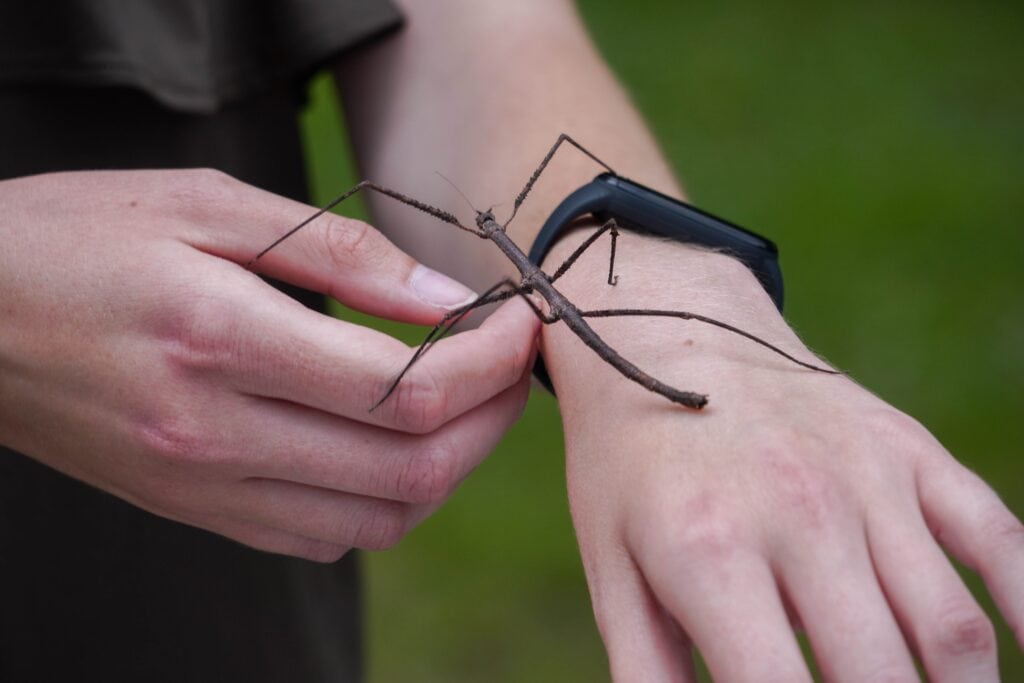
And while most insect bites or stings aren’t dangerous to humans, some people have severe allergic reactions that can be life-threatening.
So if an insect is posing a threat to your safety or the safety of others, and you can’t politely shoo them away, then it’s okay to kill them as a vegan.
Scenario 3 – intentionally killing bugs to protect them from infestation
Every summer for a month, my pantry gets infested with sugar ants. They’re incredibly persistent, and if I leave them, they create trails all over the house and attack our food. So I deal with them. It sucks. I don’t like it. But living with an infestation isn’t an option.
If there’s an infestation in your home, and all other efforts to remove them ethically have failed, then it’s probably okay to kill them as a vegan.
Scenario 4 – accidentally killing bugs
Let’s say you’re walking through a park minding your own business when a wasp suddenly starts buzzing around your head. You swat at it in panic and accidentally kill the wasp.
In this situation, the wasp wasn’t posing any threat to you, and you didn’t intend to kill it. The same thing happens when you walk on a footpath, unknowingly squishing bugs or running over them with your car.
There’s no way to avoid harming or killing insects when we share the same outdoor spaces. And while that’s not ideal, these deaths are accidental and unavoidable.
Scenario 5 – intentionally killing insects out of annoyance or fear
This is the scenario where I question my moral compass as a vegan. I’ll come out and say it. I hate flies. I hated them for as long as I remember—before and after going vegan.
The thought of them buzzing in my ear or bothering me when I’m trying to talk with friends on a hot summer’s day makes my blood boil.
My first preference is to tolerate annoying and invasive bugs like flies. I shoo them out, escort them out of the house, and 99% of the time, that’s okay.
But when they get too much, I sometimes resort to fighting back. At some point, it gets personal. So call me a hypocrite. I accept it. And I respect those of you who are highly tolerant and unbothered by these annoyances.
We all have different relationships with bugs and insects. But even if you’re like me and detest certain species, or alternatively, you’re scared of them—it doesn’t mean we should kill insects without first trying to remove them without any harm. If the situation becomes unmanageable and unavoidable, it’s your call to do next.
Scenario 6 – indirect insect deaths caused by crop production
A recurring argument against veganism is that crop farming causes the death of insects. And it’s true that during production, there will almost always be indirect insect deaths from:
- Soil disturbance (e.g. ploughing)
- Pesticides and herbicides
- Draining of wetlands
- Deforestation
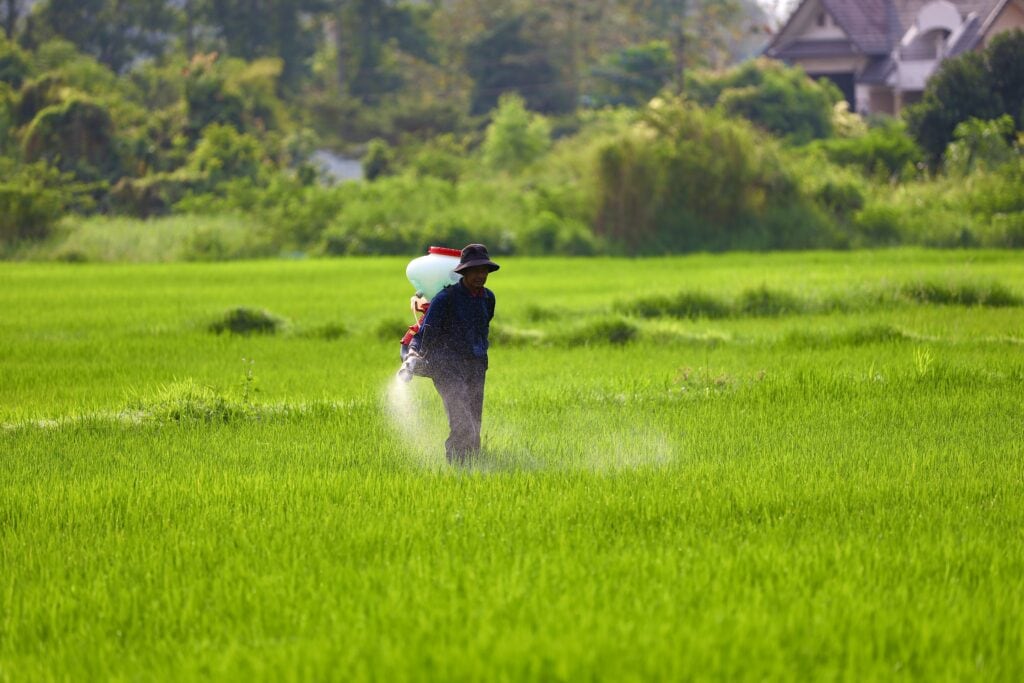
This is the unfortunate reality of human existence. The moment we start interacting with the world, we’re indirectly causing harm to others.
According to the World Health Organisation, almost 2 million people die annually from work-related causes. Occupational risk factors include: air pollution, long work hours, asthmagens, carcinogens, ergonomic risk factors, and noise. Most of which are preventable.
The WHO Global Road Safety Report highlights that 1.35 million people are killed yearly due to road traffic. Again, preventable.
Does this mean we need to stop working or driving vehicles? Many would consider that to be an unfeasible solution.
Instead, governing bodies implement laws and regulations to minimize human deaths across industries. A similar approach is needed to mitigate crop-related bug deaths.
We can do our best to reduce these deaths by supporting farmers who use more sustainable practices.
For example, some farmers use companion planting – a method of growing different plants that benefit each other. This type of agriculture discourages pests and reduces the need for harmful pesticides that often kill innocent insects.
We can also support organic farmers who don’t use synthetic pesticides or herbicides on their crops.
Read more: Why Sustainable Products Are More Expensive (And How To Save Money)
Admittedly, there’s still a long way to go in developing sustainable agriculture methods that don’t indirectly cause insect deaths. But by supporting these initiatives, we can help create the demand for change.
Do vegans kill more animals than omnivores?
The simple answer is no. Vegans do not kill more animals than omnivores. The opposite is true. Livestock production is one of the leading causes of animal death worldwide, and it also takes a significant toll on insect populations.
To produce the vast quantities of feed required by livestock farms, crops are frequently treated with pesticides that kill unfathomable amounts of insects yearly.
Furthermore, clearing land for grazing and farming is a significant driver of habitat loss, leading to the demise of countless animal species. As a result, veganism is more humane from an animal rights perspective.
If you want to get specific, google “best cow feed formula”. You’ll find that the most optimal cattle feed formulas include crops like:
- Wheat bran
- Soybean meal
- Maize grain
- Sunflower meal
- Cotton seed cake
- Rice
According to a research paper by the University of Minnesota, just 55% of crop calories are consumed by humans, 36% is used for animal feed, and the remaining 9% is attributed to biofuels and other industry uses.
So approximately 83% of agricultural land is used for animal farming, while 55 billion marine and land animals are killed directly for food each year (source).
With this combination of direct animal deaths for human consumption and indirect deaths from animal feed and deforestation for animal agriculture, it’s clear that omnivores kill significantly more animals than vegans, insects included.
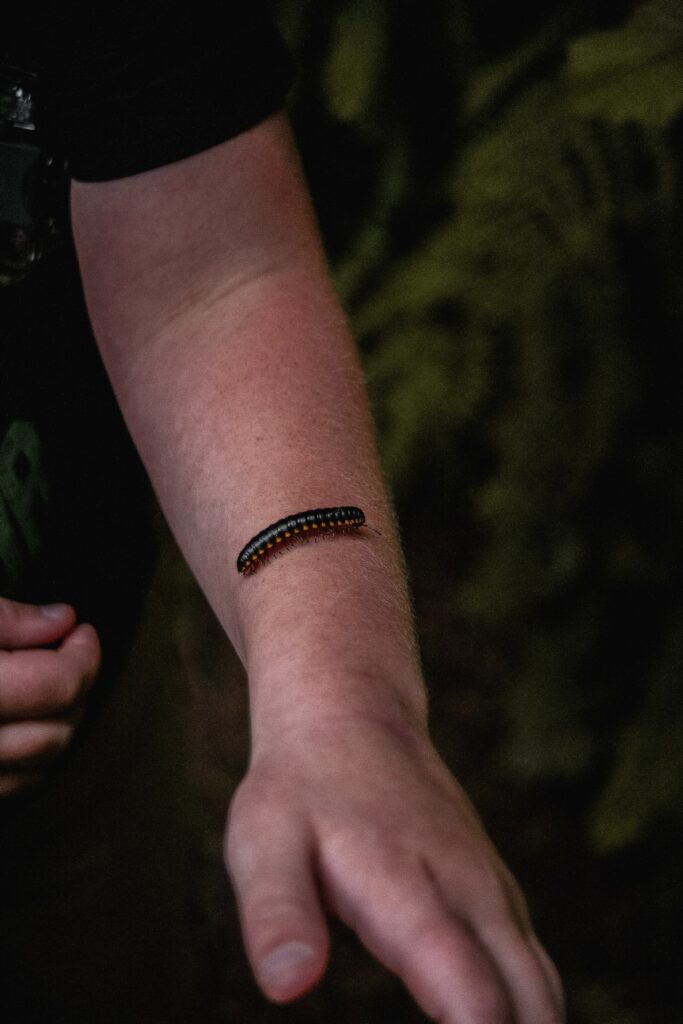
So if we accept that veganism is about reducing harm to sentient beings as much as is practical, even when it comes to insect suffering, veganism is still a morally preferable lifestyle.
We still need to do everything we can to minimize insect deaths, but I also understand that sustainable organic crop farming isn’t yet feasible on a global scale.
Do vegans kill bugs? Final thoughts
There’s no doubt that veganism is more humane from an animal rights perspective, but that doesn’t mean vegans can rest easy knowing they’re not harming any animals.
The sad reality is that crop farming inevitably kills insects, and as long as we rely on plants for food, there’s no way to avoid it.
What we can do, however, is support sustainable agriculture initiatives that minimize insect death and habitat loss. We can also be mindful of our impact by choosing organic products whenever possible.
And when it comes to dealing with insects in your home, remember that most of them are just trying to find a place to live, not looking for a fight. So please, do your best to show them some compassion. After all, they’re just doing what comes naturally to them.
You have to decide what level of harm you’re comfortable causing other beings. That’s what veganism is about. I’m happy to do my part in reducing unnecessary insect suffering, even if it means my actions aren’t perfect.
What are your thoughts on this issue? Let me know in the comments below.



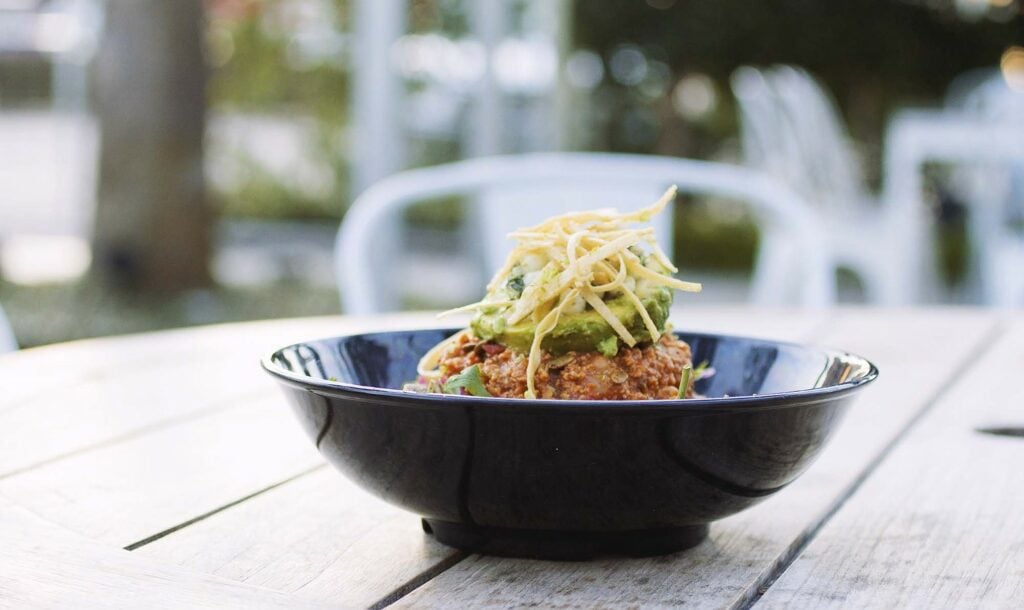

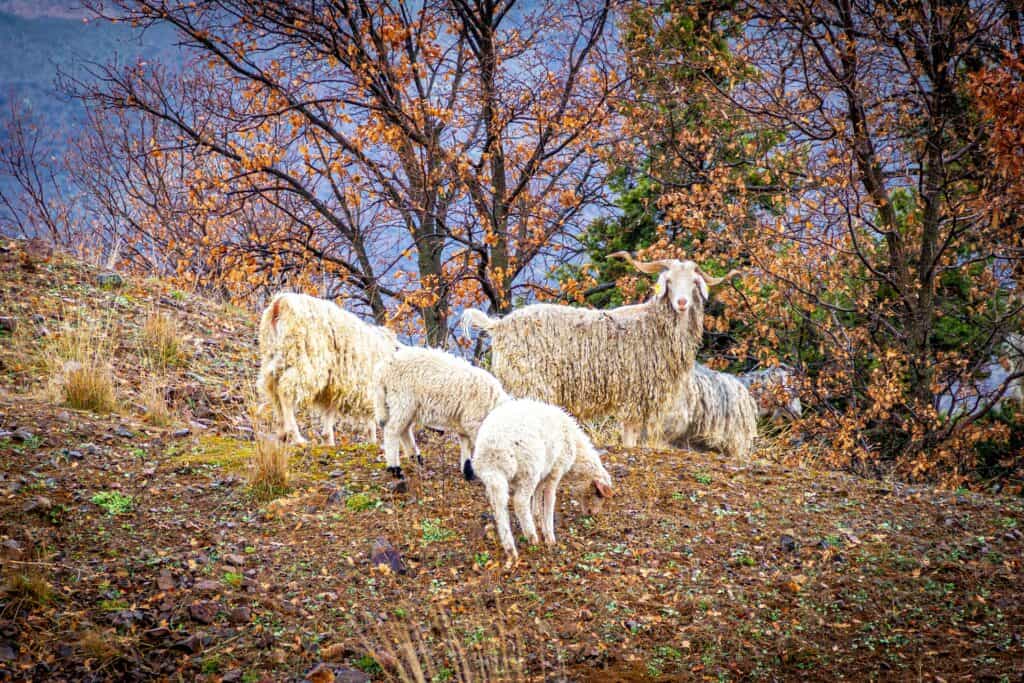
You’re stating that animals are sentient beings? They have a soul? A belief in transitional eternal afterlife ? And an awareness of that belief?
I guess I look at it from the exploitation perspective.. are vegans exploiting insects to produce crops? simple answer is no. the crops would grow with or without the insects. this doesn’t excuse the cruelty/harm that pesticides do to insects.. however it does leave me to question is this actually a vegan issue? I would suggest it’s an economic/ecology/biodiversity issue more than a vegan one. As vegans we clearly care about all animal cruelty and would opt for organic options where possible. This is in stark contrast to environmental activists who would talk about the ecological problems of using pesticides but who themselves are not vegan.
There are many instances, you’ve outlined some, where cruelty happens and it’s not a vegan concern..
A few years ago, in the UK, there was an incident where a woman put a cat in a wheelie bin. the cat was a stray and alive, she literally picked the cat up and put her in the bin, shut the lid and walked off – it was all caught on CCTV. now, this is an act of cruelty, no doubt, and as a human being I was appalled and upset, but the reality was as a vegan there is very little I can do to stop these types of cruelty from happening – this situation was a case for cat protection/animal welfare/animal abuse organisations and the police.
Great article as always! I try to avoid killing bugs, but sometimes as in case with mosquitoes and cockroaches it is just the reflexive reaction((
Thank you for your article scenario six especially. I’m always being harassed by family members for being vegan and I just got harassed because it’s world animal day so I’ve sent them your link and told them to read scenario six. Once again thank you.
Oh my goodness, yes. Disease-carrying and biting beings are my challenge. Especially as someone who reacts allergically. I do everything in my power to avoid killing (I have a great mosquito and no-see-um recipe on my site that truly works). And I feel horrible if I do kill something. I literally say, “oh my god, I’m a murderer” and it makes me try harder next time to find a better solution (yesterday I kept my bike bell on while riding, to warn the grasshoppers I was coming, and it truly made a difference, helping to keep them out of my bike path). As long as we care about doing better and we keep trying, that is vital.
Insects killed to grow crops is a question I’ve been worrying at for a while, rarely do I find satisfactory answer. However we look at it, vegans contribute to the intentional suffering and death of vast numbers of insects because so many are killed to grow crops. The usual dodge is to say that pest deaths are an unavoidable problem that we just have to live with.
I think this is fine up to a point but it does leave the vegan advocate open to a charge of hypocrisy. Why do vegans worry about the killing and eating of oysters, almost certainly not sentient, but wave away the deaths of pest insects to grow crops?
I want to offer a possible counter-argument. Importantly, growing crops instead of raising animals is a first priority of veganism because it prevents the exploitation of other species. Nonetheless, veganism is also concerned with preventing unnecessary harm to other species, regardless of context. There is no doubt that it is acceptable to kill a dangerous bug in our home, but why is it acceptable to kill potentially quadrillions of animals to grow crops?
I propose it is because insects are reproductive r-strategists. Broadly speaking, K-strategists such as cattle invest more in the individual – species success depends on individual success. R-strategists on the other hand invest less in individuals and rely on sheer numbers for species success. I suggest this means we owe less of a moral duty to r-strategists than to K-strategists. What happens to an individual cow is important because farming them is wrong but also because the individual cow is naturally important. What happens to an individual pest insect is less important because we are not exploiting them but killing them partly as a self-defence but also because an individual insect is less naturally important. Nonetheless the problem of insect suffering remains important so we should want to find pest control methods that cause less pain and suffering just because that is morally worthwhile.
Of course this doesn’t free us from the duty to prevent extreme negative impacts on species. The wrongful use of insecticides can lead to the threat of species extinction, so our duty to prevent this means we need to take seriously ways to mitigate that impact. We just cannot go killing vast numbers of insects to protect yields.
In the end we don’t need to apologise for killing pest insects.
Like you flies have to go. If they won’t leave they house I will kill them with a fly spotter. I sweep up the millipedes and put them outside and if we have a mouse problem (country life) I will also kill them because they will not leave but invite yet more of their friends. Sad but I do not want them in the house because they also carry disease
It’s not easy. We did a stint in the country, so we can relate to all the interesting creatures that come through the house. Thanks for sharing!